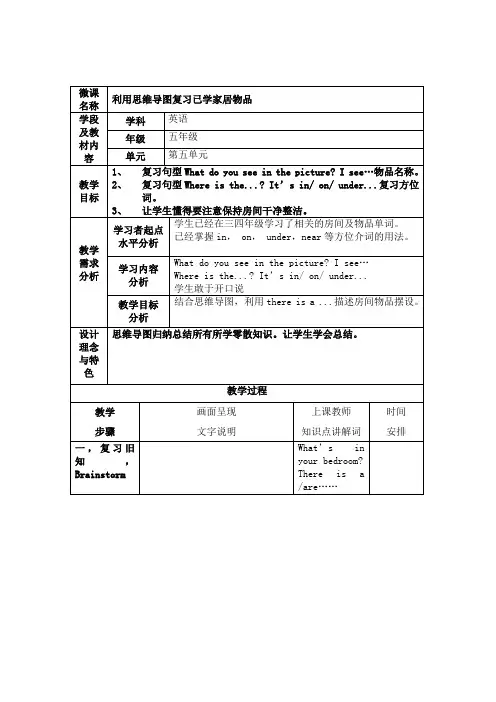五年级英语思维导图精编版
- 格式:ppt
- 大小:141.00 KB
- 文档页数:2
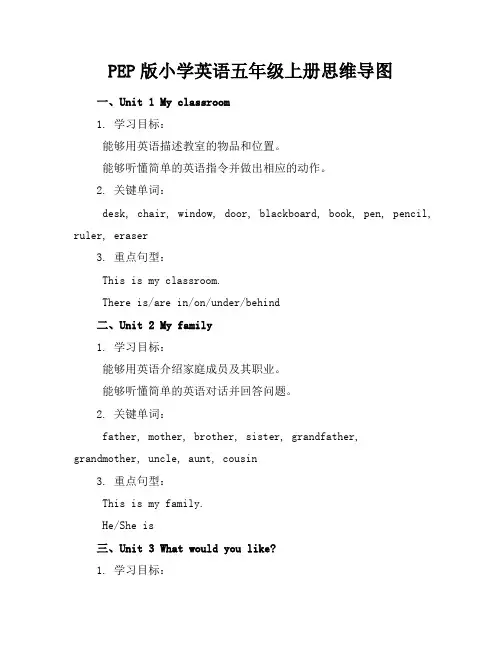
PEP版小学英语五年级上册思维导图一、Unit 1 My classroom1. 学习目标:能够用英语描述教室的物品和位置。
能够听懂简单的英语指令并做出相应的动作。
2. 关键单词:desk, chair, window, door, blackboard, book, pen, pencil, ruler, eraser3. 重点句型:This is my classroom.There is/are in/on/under/behind二、Unit 2 My family1. 学习目标:能够用英语介绍家庭成员及其职业。
能够听懂简单的英语对话并回答问题。
2. 关键单词:father, mother, brother, sister, grandfather, grandmother, uncle, aunt, cousin3. 重点句型:This is my family.He/She is三、Unit 3 What would you like?1. 学习目标:能够用英语询问和回答食物和饮料的喜好。
能够听懂简单的英语对话并做出相应的回答。
2. 关键单词:food, drink, apple, banana, orange, pear, water, milk, juice3. 重点句型:What would you like?I would like四、Unit 4 I can play basketball1. 学习目标:能够用英语描述自己的兴趣爱好。
能够听懂简单的英语对话并回答问题。
2. 关键单词:play, basketball, football, volleyball, swim, dance, sing, draw3. 重点句型:I canHe/She can五、Unit 5 There is a big bed in the bedroom1. 学习目标:能够用英语描述房间和家具的布局。
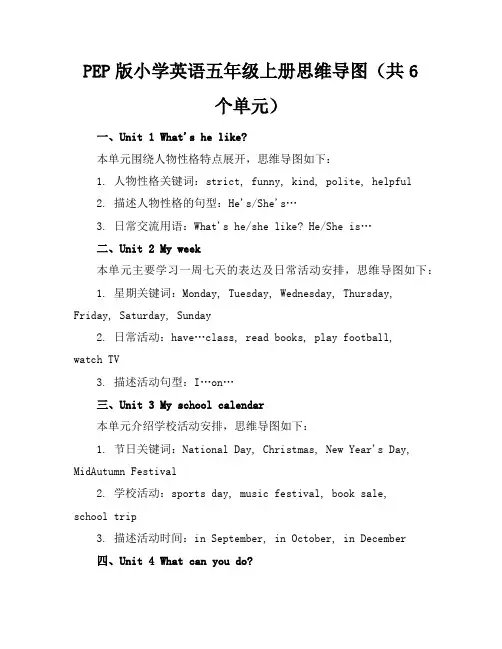
PEP版小学英语五年级上册思维导图(共6个单元)一、Unit 1 What's he like?本单元围绕人物性格特点展开,思维导图如下:1. 人物性格关键词:strict, funny, kind, polite, helpful2. 描述人物性格的句型:He's/She's…3. 日常交流用语:What's he/she like? He/She is…二、Unit 2 My week本单元主要学习一周七天的表达及日常活动安排,思维导图如下:1. 星期关键词:Monday, Tuesday, Wednesday, Thursday, Friday, Saturday, Sunday2. 日常活动:have…class, read books, play football,watch TV3. 描述活动句型:I…on…三、Unit 3 My school calendar本单元介绍学校活动安排,思维导图如下:1. 节日关键词:National Day, Christmas, New Year's Day, MidAutumn Festival2. 学校活动:sports day, music festival, book sale,school trip3. 描述活动时间:in September, in October, in December四、Unit 4 What can you do?本单元讨论个人能力,思维导图如下:1. 能力关键词:sing, dance, draw pictures, cook, play chess2. 描述能力句型:I can…3. 询问能力:What can you do?五、Unit 5 My new room本单元学习描述房间及物品位置,思维导图如下:1. 房间物品:bed, desk, chair, bookcase, floor2. 位置关键词:in, on, under, near3. 描述物品位置:The…is…六、Unit 6 In a nature park本单元介绍自然公园的景色及方位,思维导图如下:1. 自然景观:hill, mountain, river, lake, forest2. 方位关键词:north, south, east, west3. 描述方位:It's in the…PEP版小学英语五年级上册思维导图(共6个单元)七、单元间的联系与拓展在掌握了每个单元的核心内容后,我们来探讨一下这些单元之间的联系以及如何在实际生活中拓展运用。

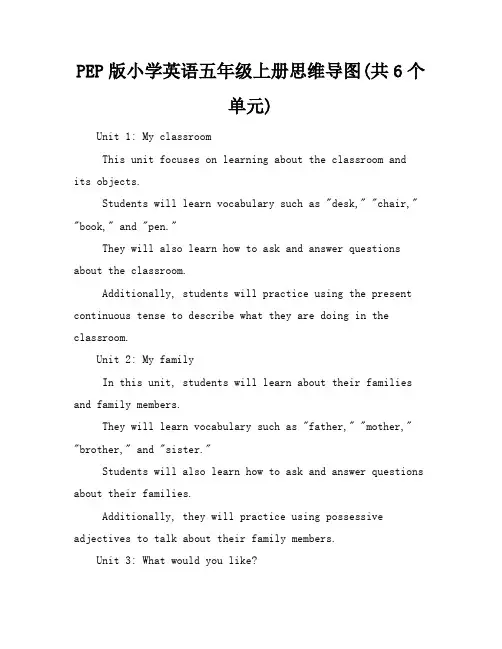
PEP版小学英语五年级上册思维导图(共6个单元)Unit 1: My classroomThis unit focuses on learning about the classroom andits objects.Students will learn vocabulary such as "desk," "chair," "book," and "pen."They will also learn how to ask and answer questions about the classroom.Additionally, students will practice using the present continuous tense to describe what they are doing in the classroom.Unit 2: My familyIn this unit, students will learn about their families and family members.They will learn vocabulary such as "father," "mother," "brother," and "sister."Students will also learn how to ask and answer questions about their families.Additionally, they will practice using possessive adjectives to talk about their family members.Unit 3: What would you like?This unit focuses on learning about food and drink.Students will learn vocabulary such as "apple," "banana," "juice," and "water."They will also learn how to ask and answer questions about food preferences.Additionally, students will practice using the simple past tense to talk about past experiences with food.Unit 4: I can play basketballIn this unit, students will learn about sports and physical activities.They will learn vocabulary such as "basketball," "football," "swimming," and "running."Students will also learn how to ask and answer questions about sports and activities.Additionally, they will practice using the present tense to talk about their abilities and experiences in sports.Unit 5: There is a big bed in the roomThis unit focuses on learning about rooms and furniture in a house.Students will learn vocabulary such as "bed," "table," "chair," and "sofa."They will also learn how to ask and answer questions about rooms and furniture.Additionally, students will practice using the present continuous tense to describe what they are doing in different rooms.Unit 6: In a nature parkIn this unit, students will learn about nature and outdoor activities.They will learn vocabulary such as "tree," "flower," "river," and "mountain."They will also learn how to ask and answer questions about nature and outdoor activities.Additionally, students will practice using the present tense to talk about their experiences in nature.Unit 1: My classroomDevelop the ability to describe actions and activities happening in the classroom using the present continuous tense.Engage in interactive dialogues to ask and answer questions about the classroom setup and ongoing activities.Unit 2: My familyLearn to express and recognize family relationshipsusing possessive adjectives and nouns.Develop the skill to ask and respond to questions about family members and their characteristics.Explore the concept of family through engagingactivities and discussions.Unit 3: What would you like?Expand vocabulary related to food and drink items.Practice asking and answering questions about personal food preferences.Develop an understanding of the simple past tense discussing past experiences with food.Unit 4: I can play basketballIntroduce sports vocabulary and encourage physical activity.Learn to describe abilities and experiences in sports using the present tense.Engage in roleplaying activities to practice asking and answering questions about sports.Unit 5: There is a big bed in the roomExplore different rooms and their associated furniture.Develop the ability to describe the appearance and purpose of various furniture items.Practice using the present continuous tense to talk about ongoing actions in different rooms.Unit 6: In a nature parkLearn vocabulary related to nature and outdoor activities.Develop the skill to ask and answer questions about experiences in nature.Explore the concept of nature through engagingactivities and discussions.Unit 1: My classroomEngage in interactive activities to learn and identify classroom objects.Develop the ability to describe actions and activities happening in the classroom using the present continuous tense.Practice asking and answering questions about the classroom setup and ongoing activities.Unit 2: My familyLearn to express and recognize family relationshipsusing possessive adjectives and nouns.Develop the skill to ask and respond to questions about family members and their characteristics.Explore the concept of family through engagingactivities and discussions.Unit 3: What would you like?Expand vocabulary related to food and drink items.Practice asking and answering questions about personal food preferences.Develop an understanding of the simple past tense discussing past experiences with food.Unit 4: I can play basketballIntroduce sports vocabulary and encourage physical activity.Learn to describe abilities and experiences in sports using the present tense.Engage in roleplaying activities to practice asking and answering questions about sports.Unit 5: There is a big bed in the roomExplore different rooms and their associated furniture.Develop the ability to describe the appearance and purpose of various furniture items.Practice using the present continuous tense to talk about ongoing actions in different rooms.Unit 6: In a nature parkLearn vocabulary related to nature and outdoor activities.Develop the skill to ask and answer questions about experiences in nature.Explore the concept of nature through engagingactivities and discussions.。
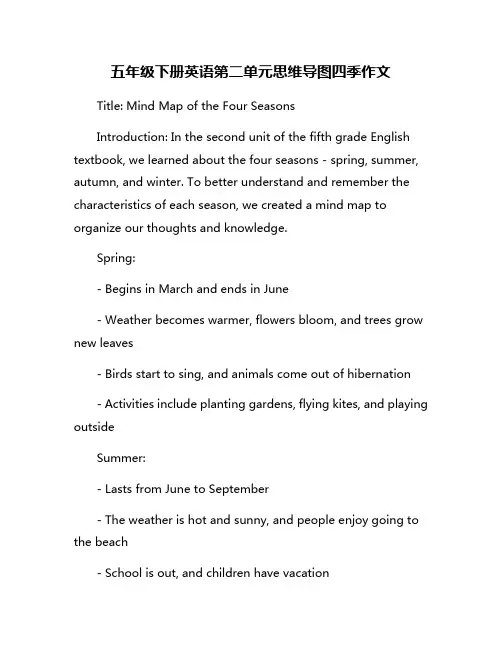
五年级下册英语第二单元思维导图四季作文Title: Mind Map of the Four SeasonsIntroduction: In the second unit of the fifth grade English textbook, we learned about the four seasons - spring, summer, autumn, and winter. To better understand and remember the characteristics of each season, we created a mind map to organize our thoughts and knowledge.Spring:- Begins in March and ends in June- Weather becomes warmer, flowers bloom, and trees grow new leaves- Birds start to sing, and animals come out of hibernation- Activities include planting gardens, flying kites, and playing outsideSummer:- Lasts from June to September- The weather is hot and sunny, and people enjoy going to the beach- School is out, and children have vacation- Popular activities are swimming, camping, and having barbecuesAutumn:- Begins in September and ends in December- The weather starts to cool down, and leaves change color- Harvest festivals and Halloween are celebrated in autumn- People go apple picking, jump into piles of leaves, and drink hot apple ciderWinter:- Lasts from December to March- The weather is cold, and snow may fall- People celebrate holidays like Christmas and New Year's- Activities include building snowmen, ice skating, and drinking hot chocolateConclusion: By creating a mind map of the four seasons, we have gained a deeper understanding of the unique characteristics and activities associated with each season. This visual aid has helped us remember the information better and appreciate the beauty of nature throughout the year.。
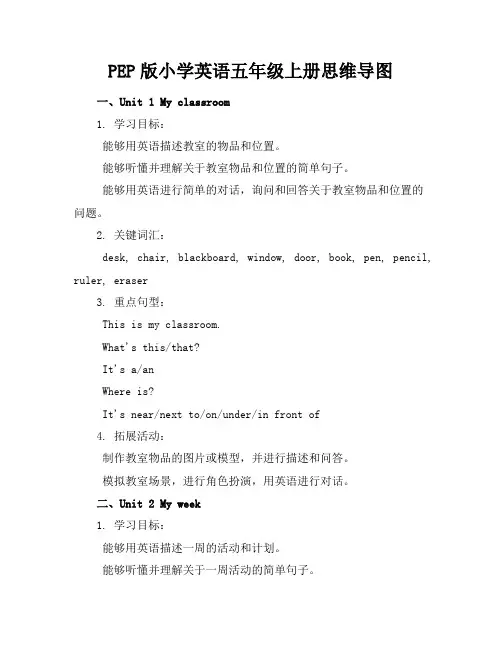
PEP版小学英语五年级上册思维导图一、Unit 1 My classroom1. 学习目标:能够用英语描述教室的物品和位置。
能够听懂并理解关于教室物品和位置的简单句子。
能够用英语进行简单的对话,询问和回答关于教室物品和位置的问题。
2. 关键词汇:desk, chair, blackboard, window, door, book, pen, pencil, ruler, eraser3. 重点句型:This is my classroom.What's this/that?It's a/anWhere is?It's near/next to/on/under/in front of4. 拓展活动:制作教室物品的图片或模型,并进行描述和问答。
模拟教室场景,进行角色扮演,用英语进行对话。
二、Unit 2 My week1. 学习目标:能够用英语描述一周的活动和计划。
能够听懂并理解关于一周活动的简单句子。
能够用英语进行简单的对话,询问和回答关于一周活动的问题。
2. 关键词汇:Monday, Tuesday, Wednesday, Thursday, Friday, Saturday, Sundaymorning, afternoon, eveninghave lessons, do homework, play sports, watch TV, go shopping, visit friends3. 重点句型:What do you do on Mondays?I have lessons in the morning and do my homework in the afternoon.Do you play sports on weekends?Yes, I play football with my friends.4. 拓展活动:制作一周活动的时间表,并用英语进行描述。
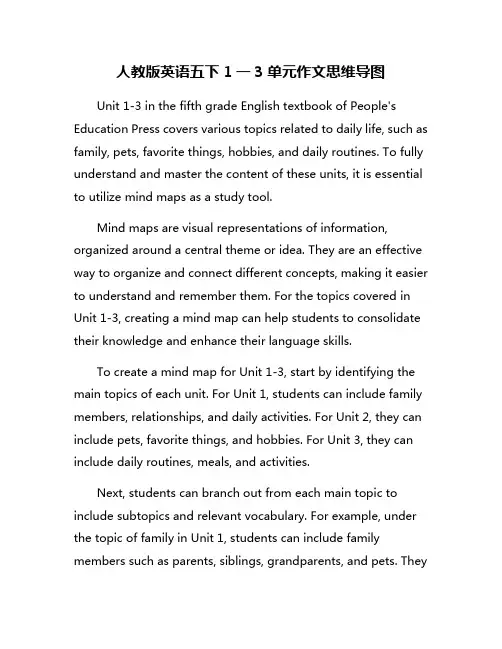
人教版英语五下1一3单元作文思维导图Unit 1-3 in the fifth grade English textbook of People's Education Press covers various topics related to daily life, such as family, pets, favorite things, hobbies, and daily routines. To fully understand and master the content of these units, it is essential to utilize mind maps as a study tool.Mind maps are visual representations of information, organized around a central theme or idea. They are an effective way to organize and connect different concepts, making it easier to understand and remember them. For the topics covered in Unit 1-3, creating a mind map can help students to consolidate their knowledge and enhance their language skills.To create a mind map for Unit 1-3, start by identifying the main topics of each unit. For Unit 1, students can include family members, relationships, and daily activities. For Unit 2, they can include pets, favorite things, and hobbies. For Unit 3, they can include daily routines, meals, and activities.Next, students can branch out from each main topic to include subtopics and relevant vocabulary. For example, under the topic of family in Unit 1, students can include family members such as parents, siblings, grandparents, and pets. Theycan also include verbs related to daily activities, such as eat, sleep, study, play, and work.For Unit 2, students can include different types of pets, favorite things such as colors, foods, and activities, and hobbies like reading, drawing, dancing, and playing sports. For Unit 3, students can include verbs related to daily routines, meals such as breakfast, lunch, and dinner, and activities such as doing homework, watching TV, and playing games.In addition to organizing vocabulary and concepts, mind maps can also be used to practice language skills such as making sentences, asking and answering questions, and describing people and things. Students can use the information on their mind maps to create sentences like "My father works in an office" or "I like to play with my dog." They can also ask questions like "What is your favorite color?" or "Do you have any pets?"Overall, creating a mind map for Unit 1-3 in the fifth grade English textbook can be a fun and effective way for students to review and practice the language they have learned. By organizing information visually and making connections between different concepts, students can improve their language skills and build confidence in using English in theirdaily lives. Mind maps are a valuable study tool that can help students to achieve success in their English learning journey.。
